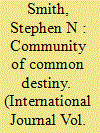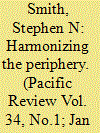| Srl | Item |
| 1 |
ID:
161614


|
|
|
|
|
| Summary/Abstract |
This essay will discuss China’s re-emergence as a great power through the lens of the English School. Following Ian Clark, I reconceptualize international society as a set of historically changing principles of legitimacy. I argue that China’s “new assertiveness” under Xi Jinping is best explained by China’s pursuit of legitimacy in an international arena where norms of legitimate modes of governance, development, and ordering principles have long been defined by the West. Furthermore, this essay will examine one recent development in Chinese International Relations theory, gongsheng, which purports to offer an alternative normative basis for interstate order, and probe its relationship to Xi Jinping’s recent declaration to build a “community of common destiny” in Asia.
|
|
|
|
|
|
|
|
|
|
|
|
|
|
|
|
| 2 |
ID:
177665


|
|
|
|
|
| Summary/Abstract |
This paper investigates how Chinese elites understand the proper role of their nation vis-à-vis its ‘periphery’ and how this self-understanding shapes Chinese strategic policy toward neighboring states. It makes two specific arguments. First, after 2012 China began to understand itself as responsible for actively managing and shaping its periphery. Xi Jinping has overseen an evolution in China’s neighborhood strategy that has changed from mere engagement to proactive efforts to shape regional order. Efforts to achieve this goal have come primarily through: institution-building and regional integration via the ‘Belt and Road Initiative’, strategic partnerships, normative binding, and developmental statecraft. Second, managing newly emerged power asymmetries between China and its neighbors is now a crucial task of Beijing’s peripheral policy. The emerging China-led regional order relies on norms that are hierarchical, transactional, and reflect status distinctions. Xi Jinping’s neighborhood strategy rests on an asymmetric bargain: respect China’s core interests in exchange for benevolence.
|
|
|
|
|
|
|
|
|
|
|
|
|
|
|
|